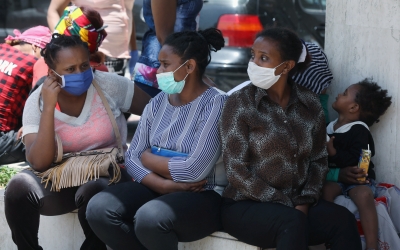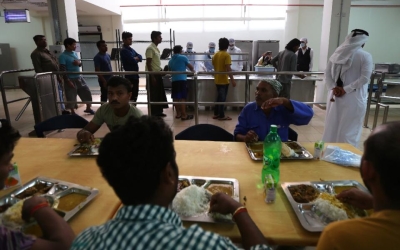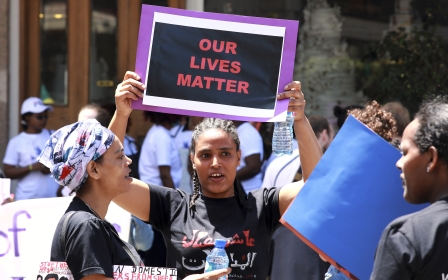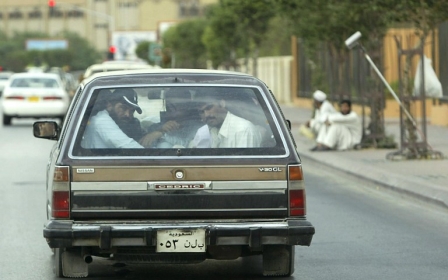'Like I'm in a cage': Domestic workers trapped and abused in lockdown London

Crouched in the corner of a claustrophobic room, intermittently stifling her tears with a towel, Lyn whispers over a video call.
“I feel like I’m in a cage,” the Filipino domestic worker tells Middle East Eye.
Lyn is a live-in carer for an elderly man who for the past three months has forbidden her from leaving the flat, even to take the lift down to the reception.
She is one of many domestic workers working for Gulf Arab families currently residing in locked-down London, where coronavirus fears and preventative measures have exacerbated already draconian and often abusive situations.
Already excluded from many labour protections and subjected to overwork, delayed or withheld wages, and in some cases mental and physical abuse, lockdown has sharpened these conditions, and further exposed this already vulnerable workforce.
Kalayaan, a London-based campaign group for migrant domestic workers, told MEE it has received reports from a number of workers who have been dismissed from jobs and with no entitlement to support, left destitute, or been forced to work increased hours or face losing their income or accommodation.
That’s a threat that Lyn feels particularly.
“I have to listen to him because I might lose my job. It’s very hard for me to find a new job, especially in this pandemic situation. At least here, they give me food,” she tells Middle East Eye.
To distract herself, Lyn watches buses pass by, and, as lockdown eases for others, listens to the inviting sounds of revellers in a nearby park. Working in private households, Lyn has been forced to the peripheries of public life. Now, bound to her room, she has practically disappeared into obscurity.
Despite the intimate nature of her job and near-constant hours, Lyn’s work is badly remunerated. She works 20 hours a day in six-day weeks, earning just £450 ($565) a week.
Restricted to the four rooms of the flat, Lyn hasn’t just lost her liberty but her salary. She hasn’t been paid since lockdown began on 23 March.
When she asked for her wages, her employer pretended not to hear her. “Maybe he thinks I don’t need it because I can’t go out,” she says.
Her employer is not openly abusive, but he has a short fuse. Her confinement and his bursts of anger recall past traumas: “If somebody talks to me like that, it reminds me of my employers in Riyadh... they would tell me, you don’t have any money, you don’t have a brain. It’s emotional and psychological stress... it breaks your confidence.”
Like many migrant domestic workers in the UK, Lyn is a survivor of abuse. She was brought to the UK by a wealthy Saudi family from Riyadh.
Compelled to seek work abroad to support her children, Lyn was contracted to work for the family via an agency in the Philippines. The contract stipulated she would work eight hours a day, six days a week. When she arrived in Riyadh, however, she had her documents confiscated and was forced to work 20 hours a day with no day off.
Exploitative system
Lyn’s story is a common one. The International Trade Union Confederation estimates 2.4 million domestic workers are facing conditions of slavery.
It’s a big business: agencies fly in 40,000 domestic workers a month into Saudi Arabia alone. Back in the Philippines, domestic workers’ wages account for nearly 15 percent of the country’s GDP.
These women are brought in under the exploitative kafala (sponsorship) system which legally binds migrant workers to their employers. Should they escape, they face imprisonment or heavy fines.
The abuse ranges from economic - overwork, withdrawal of wages - to physical - beatings, sexual violence, starvation, bodily mutilation.
The founder of an informal support network for domestic workers in the Middle East, Karl Anderson, has heard from women who’ve been forced to eat dog food while cleaning mansions, another who’d been severely burnt, and one who had been trapped in the house for four years and denied wages.
'Leaving these workers undocumented and destitute at a time of crisis has obvious human rights implications'
- Virginia Mantouvalou, UCL professor
Lyn’s employers brought her to the UK on a tied visa, one that binds foreign domestic workers to a single named employer.
Introduced in 2012 to reduce an influx of migrant workers and lure wealthy families from the Gulf states, the tied visa practice prohibited workers from changing their employer. If they did, they would become undocumented.
According to Kalayaan, reported cases of abuse multiplied as a result.
A freedom of information request made by Kalayaan in 2017 found the three countries with the highest number of applications for overseas domestic workers visas were from UAE (5,135), Saudi Arabia (4,945), and Qatar (4,395).
The visa tie, which has been described as an extension of the kafala system, was amended by the 2015 Modern Slavery Act, which reinstated the right to change employer, but only within the six-month window of their visa.
Beyond that period, unless the women manage to convince the National Referral Mechanism (NRM) they have been trafficked, they have to choose between their current exploitative situation, a precarious new employment or face becoming undocumented.
“Through both immigration regimes, the law creates vulnerability to exploitation. And employers routinely and systematically take advantage of this situation by violating workers’ rights and other human rights,” Virginia Mantouvalou, a law professor at University College London (UCL), told MEE.
“Leaving these workers undocumented and destitute at a time of crisis has obvious human rights implications. It is essential for the government to automatically extend the domestic worker visa for six months and increase their financial support.”
Seeking help
Lyn managed to escape her previous employer after she sought help from a parent when picking up one of the family’s children from school. The woman reported her to the police who told her to apply for the NRM and put her in touch with a migrant domestic worker support group, Voice of Domestic Workers, who helped her escape.
Lyn was free from her employer, but faced an uncertain future.
She had qualified for the first positive reasonable ground decision, but not for the second “conclusive” ground, leaving her undocumented and subsisting off NRM payments of just £35 a week.
Marissa Begonia, founder of Voice of Domestic Workers (VDW), receives a minimum of five to 10 calls for help a month. She coordinates rescues of domestic workers, using her own home as a safe house.
“Communication is the biggest problem,” she tells MEE. The women often don’t have UK SIM cards, they manage to contact the group via patchy Wifi.
“Usually we meet them in parks to give them the SIM cards, or even plant them in the bin, then we wait outside their house to collect them.”
Lockdown has ground this operation to a halt. Marissa was contacted by a woman who was being beaten daily by her employer, but says “we couldn’t rescue them in person, so we tried to arrange for a taxi and a hotel to quarantine them, but we lost communication with them”.
The isolation and income loss brought by lockdown is compounded by hostile environment policies that have left many migrant domestic workers destitute with no recourse to public funds.
To try to mitigate their suffering, VDW set up a hardship fund for workers during the pandemic.
Covid-19 has forced a re-evaluation of what constitutes essential work, it has unveiled the invisible, often unpaid work of care performed by migrant women that keeps the lights on.
Despite this public reckoning, domestic workers still lack visibility. They are not recognised as “key workers” and are excluded from government support schemes during the pandemic.
With the pandemic, undocumented domestic workers are facing a “double tragedy” as they cannot access healthcare, Marissa says.
“Many of them have fallen ill with Covid... I was trying to encourage one of our members who was suffering from asthma to go to A and E [emergency room], I couldn’t convince her, she was too scared she’d be deported,” she says.
Lack of recognition from the UK government about the centrality of domestic work to the smooth running of the economy has not only eroded basic protections for these workers, but their own feelings of self-worth.
Though employers and governmental policies – both in the UK and Gulf states – have helped foster a feeling of expendability among domestic workers, VDW has sought to teach them that they are not dispensable.
Through her tears, Lyn speaks with pride about how the group has helped her rebuild her confidence through counselling, English and IT classes, now conducted via Zoom through lockdown.
“I know now I’m not stupid, and I’m not crazy... I’m getting back my dignity,” she says.
“When I go back to the Philippines I want to share what I have learnt, that we are not just workers, we are human beings.”
Middle East Eye propose une couverture et une analyse indépendantes et incomparables du Moyen-Orient, de l’Afrique du Nord et d’autres régions du monde. Pour en savoir plus sur la reprise de ce contenu et les frais qui s’appliquent, veuillez remplir ce formulaire [en anglais]. Pour en savoir plus sur MEE, cliquez ici [en anglais].






